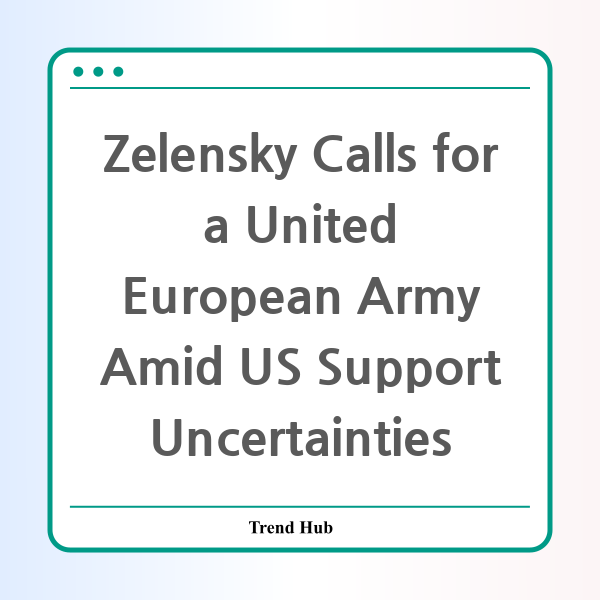* This website participates in the Amazon Affiliate Program and earns from qualifying purchases.

As the geopolitical landscape continues to shift dramatically, Ukraine's President Volodymyr Zelensky has made a striking call for the formation of an "army of Europe." This urgent request comes during a critical period where historical alliances appear to be changing, and the traditional support from the United States for European security is in question.
At a recent conference in Munich, Zelensky voiced his concerns that the days of assured American backing for Europe are diminishing. He stated unequivocally, "The old days are over when America supported Europe just because it always had." This remark encapsulates a growing sentiment that Europe must evolve and prepare for an independent role in its defense against external threats, primarily from Russia.
One of the core elements of Zelensky's statement was the pressing need for a united European military force. He argued that with the evident shift in the US foreign policy landscape — highlighted by the recent interactions between former President Donald Trump and Russian President Vladimir Putin — European nations face a formidable challenge. The President indicated that Europe should not only expect but must also be prepared for a potential decline in US military support. As he put it, "Now we can't rule out the possibility that America might say no to Europe on an issue that threatens it."
Zelensky's reflections come at a time when decision-making processes regarding European security appear to sideline Ukraine, a country that has been on the front lines of the conflict with Russia. He made it clear that any negotiations involving Ukraine must include its participation, stating, "Ukraine would never accept deals made behind our backs without our involvement." This assertion underscores the critical need for Ukraine to play a key role in shaping its own future and in the collective security of Europe.
Adding to this complexity, discussions have emerged regarding NATO membership for Ukraine. Recent statements from US officials suggest a reluctance to expedite this process, prompting Zelensky to reaffirm that he would not remove Ukraine's NATO aspirations from the table, indicating a long-term strategy that remains flexible despite current challenges.
The implications of Zelensky's call for a European army are significant. Not only does it reflect urgent strategic considerations, but it also resonates with historical discussions within Europe about its military independence. Prominent leaders, including French President Emmanuel Macron, have previously advocated for a stronger collective European military capability to reduce reliance on US forces. However, this proposal has faced resistance from various quarters, highlighting the complexities involved in creating a unified defense force.
As we approach nearly three years since Russia's full-scale invasion of Ukraine, the stakes have never been higher. The challenges posed by the ongoing conflict and the evolving diplomatic landscape require European nations to reconsider their approach to defense and alliances. The urgency expressed by Zelensky serves as a rallying cry for a proactive response to these challenges, emphasizing that Europe must chart its own course in an uncertain world.
In conclusion, Volodymyr Zelensky's call for a united European army is not merely a proposal for military collaboration; it is a fundamental recognition of the need for Europe to evolve in its geopolitical strategy. As the dynamics of international relations continue to shift, the question remains: Is Europe ready to forge a new path for its defense, one that is independent and resilient in the face of external pressures? The time for decisive action is now.
* This website participates in the Amazon Affiliate Program and earns from qualifying purchases.